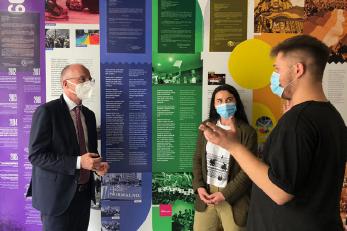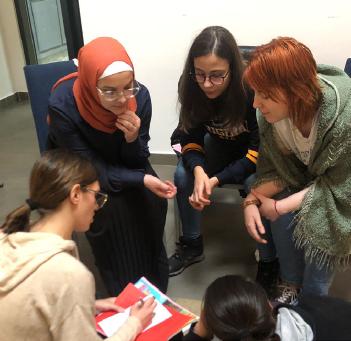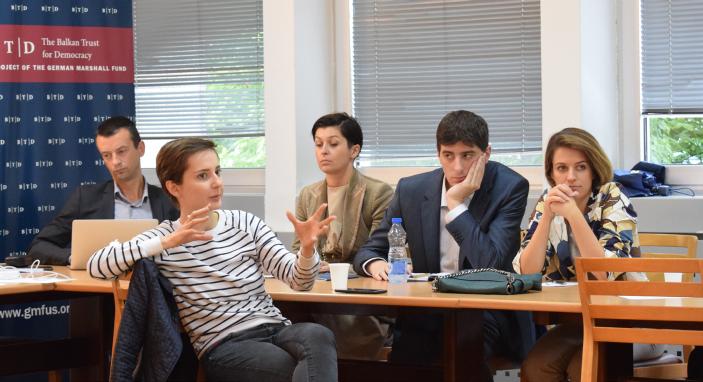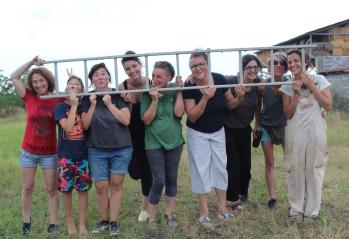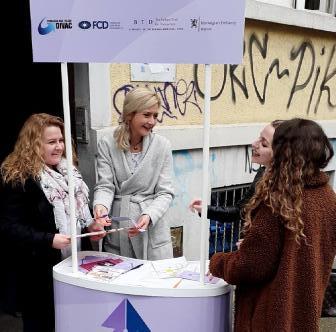Balkan Trust for Democracy
The German Marshall Fund of the United States
The Global Development Alliance Excellence Award
In 2005, USAID presented BTD with the annual Global Development Alliance Excellence Award. The award recognized BTD’s innovative public-private partnership model that strengthens citizens’ involvement in democracy building and supports cross- border collaboation in Southeastern Europe. It acknowledged BTD’s founding partners — USAID, GMF, and the Charles Stewart Mott Foundation — as well as subsequent partners.
The Balkan Trust for Democracy (BTD) of the German Marshall Fund of the United States (GMF) was founded in 2003 as an innovative and flexible transatlantic publicprivate partnership in support of democratic consolidation in Southeast Europe. With its civil society support, policy dialogues, and leadership development work, BTD enhances citizens’ engagement in democracy building and supports regional collaboration in the Western Balkans. Part of the GMF network, with its headquarters in Washington and seven offices in
Europe, BTD is uniquely positioned to generate ideas, create networks, and build consensus on Balkan issues from a broad, multistakeholder perspective by connecting the region’s leaders and activists with EU and US institutions and individuals. BTD is committed to developing the next generation of Balkan leaders and activists through a wide range of opportunities to train, connect, and empower organizations and individuals who will be agents of change and generators of ideas, leadership, and hope in their societies.
Civil Society Support
BTD supports the democratic consolidation and Euro-Atlantic integration of the Balkans by assisting reform processes and strengthening regional collaboration. It awards grants to civil society organizations to support projects on democracy and good governance, the rule of law, policy dialogue and networking, regional cooperation, and EU integration.
BTD’s grantmaking activities focus primarily on the Western Balkan countries. BTD also supports relevant cross-border and regional initiatives that include civil society stakeholders from other European countries.
22
In-Country Grants - Current Focus
In-Country Grants - Past Work*
*Grantmaking in Romania, Bulgaria, Moldova, and Croatia was discontinued in 2013. However, Croatia was included in Covid-19 Immediate Relief Response in 2021.
19 Sustainable Regional Networks of 96 CSOs on Themes Dealing
Policy Dialogue
BTD is dedicated to accelerating the Balkans’ integration into Euro-Atlantic structures and to raising the international profile of the region. It strengthens transatlantic cooperation through convening policy dialogues between civic, political, and business leaders from the Balkans and their counterparts in Europe and the United States.
Balkan Dialogues Berlin, Germany
Europe & Periphery at Risk Vienna, Austria
Point Conference Sarajevo, BiH
Belgrade Security Conference
Balkan Peer Exchange
Transatlantic Trends Launch Belgrade, Serbia
To Be Secure Forum Budva, Montenegro
Sofia Forum Sofia Platform Sofia, Bulgaria
Western Balkans OGP Dialogue Tirana, Albania
CSO Meetings with US & EU Officials
Kosovo-Serbia Professional Exchanges
BTD is committed to developing the next generation of Balkan leaders by providing them with a wide range of leadership and networking opportunities across Europe and the United States. These enable established, mid-career, and emerging leaders to hone their leadership and professional skills as well as to forge partnerships that develop sustainable solutions to the region’s problems.
BTD Impact Highlights
BTD facilitates building networks and consensus among stakeholders on Balkan issues.
The INTERNATIONAL COMMISSION ON THE BALKANS co-founded by GMF, published a report in 2005 that stirred the debate on the future of the Western Balkans and supported the integration of the countries of Southeastern Europe into the EU and other international structures with recommendations for action to the governments of the region and to the international
Empowered Youth in Action for Diversity in Serbia and North Macedonia, Civil Rights Defenders
BTD actively supports reconciliation and normalization processes in the Balkans.
The SERBIA-KOSOVO NORMALIZATION PROCESS has been part of BTD’s work since 2010, in cooperation with the Council for Inclusive Governance (CIG). In 2015, CIG established an informal group for cooperation between parliamentarians from all the main political parties in Kosovo and Serbia, with numerous plenary meetings and smaller group activities. Recommendations and suggestions are shared and iscussed with government officials, the international community, and civil society in Kosovo and Serbia. This mechanism has created a bridge between their respective parliaments, and it is a tool for normalization and the basis for a future institutionalization of cooperation.
The REGIONAL YOUTH COOPER ATION OFFICE was established in 2016 as an independent institution promoting reconciliation and cooperation in the Western Balkans through youth exchange programs. BTD has supported this project from its inception in cooperation with the Franco-German Youth Office, and it has been joined by the Robert Bosch Foundation and the Erste Foundation, with the Ministries of Foreign Affairs of Austria, France, and Germany also involved.
Speak Up Against Violence, CURE Foundation
Regional Leadership Academy for Development for the Western Balkans, Center for Social Dialogue and Regional Initiatives
BTD provides seed support to innovative regional initiatives that amplify best practices and transfer experiences about democracies that deliver.
The POINT CONFERENCE is a leading platform for civil society in the Balkans, advocating for the use of new technologies to improve government accountability and transparency. Organized by the Accountability, Technology, and Institutional Openness Network (ActionSEE), the POINT Conference promotes civic activism and participation, and the protection of human rights and freedoms online. In a related effort, BTD is actively engaged in enhancing media literacy and combating misinformation and disinformation through SEE Check, a network of fact-checking organizations in South-Eastern
The SIGN NETWORK is a regional network of six grantmakers developing sustainable local communities and civil society. It has created a more favorable environment for the development of philanthropy and ensured significant citizens’ endorsement for civil society initiatives.
The MONITORING MATRIX was developed by the Balkan Civil Society Development Network, a network that brings together 15 organizations in Southeastern Europe. The Monitoring Matrix influenced the European Commission’s civil society support in the region with the Instrument for Pre-Accession Assistance between 2014 and 2020, through which the EU provides support to candidate and potential candidate
BTD provides flexible support to local communities, designed to respond to the needs of most vulnerable groups.
BTD provided EMERGENCY SUPPORT in response to the floods that devastated the Balkans in 2014 and to the COVID-19 pandemic in 2020–2021. It supported flood relief by creating a special Solidarity Fund in Bosnia and Herzegovina and by launching the Active Communities for Flooded Regions in Serbia project in cooperation with local partners. BTD allocated as a direct COVID-19 response $4.5 million through 107 grants: 18 to regional initiatives, 3 to cross-border initiatives, and 86 to national projects in 7 countries, with support from USAID and the Norwegian Ministry of Foreign Affairs.
BTD Donor Contributors
Charles Stewart Mott Foundation
British Foreign and Commonwealth Offce
Danish Ministry of Foreign Affairs
Norwegian Ministry of Foreign Affairs
Rockefeller Brothers Fund
BTD strengthens transatlantic collaboration by supporting unique leadership programs.
The LEADERSHIP ACADEMY FOR DEVELOPMENT was led by Francis Fukuyama and implemented by the Center on Democracy, Development and the Rule of Law. It offered an intensive off-site, executive-level training program for carefully selected government officials, business leaders and civil society representatives from the region, in partnership with collaborating host institutions in various transitional countries. BTD supported four iterations of the academy between 2017 and 2022 in Sarajevo, Belgrade, Podgorica, and Skopje, which were attended by 69 participants from |7 countries.
The TRAVEL TO EUROPE was a joint initiative of the Robert Bosch Foundation and GMF, launched in 2007, that enabled over 2,000 university students from the Western Balkan countries to visit other European countries and to expand their knowledge and understanding of the EU.
German Marshall Fund of the United States
Compagnia di San Paolo
Embassy of the Kingdom of the Netherlands, Belgrade, Serbia
Royal Norwegian Embassy in Belgrade
Swedish International Development Cooperation Agency
United States Agency for International Development
Czech Ministry of Foreign Affairs
Greek Ministry of Foreign Affairs
Robert Bosch Stiftung
Tipping Point Foundation
Strengthening Gender Equality in Serbia, Ana and Vlade Divac Foundation
Brave Steps for Local Communities, Jelena Santic Foundation
The Western Balkans’ Euro-Atlantic Integration - Regional, Transatlantic and Civil Society Perspectives, Balkan Trust for Democracy

